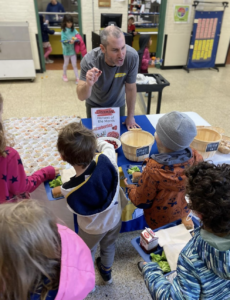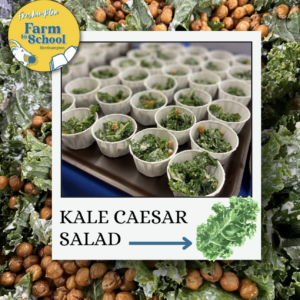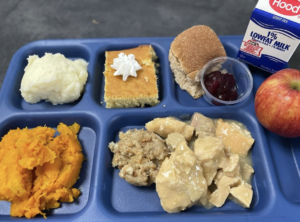
Northampton Public Schools
In an effort to bring fresh, nutritious, locally sourced meals to school cafeterias, one school district has been leveraging innovative approaches to local food procurement, supported by the Northeast Food Schools (NFS) program. This federally funded initiative has provided participating Massachusetts school districts with supplemental funds specifically to purchase locally grown foods. The district has fostered relationships with local food hubs and farmers, creating a sustainable model for incorporating local food into their menus.
At Northampton Public Schools, the commitment to sourcing local food is not just a trend; it is a transformative approach to school meals that engages students and supports local farmers. Mistelle Hannah, Food Service Director, and Bryan Jersky, Farm to School Coordinator work together to build relationships with local farmers and food hubs, create meals that incorporate local foods, and run student taste tests in the cafeteria.
When Mistelle first learned about the Northeast Food for Schools program, she saw an exciting opportunity to expand Northampton’s local food procurement efforts. While the district already had long-standing relationships with local vendors, the NFS funds provided a chance to explore new partnerships. “NFS gave us the flexibility to establish new relationships and figure out how to make those relationships sustainable,” she explained. Working together, Mistelle and Bryan researched and connected with new vendors. Bryan noted, “I started by researching local farms in the area and determining if they had the produce we were looking for.” The pair emphasize the importance of educating farmers about the operational realities of schools. Mistelle recalled conversations with farmers about the time-intensive process of preparing raw products, saying, “it was an eye-opening experience for a few farmers when we discussed what it takes to get items onto a tray.”
 The district, which has branded its farm to school program “ Freshampton” has used taste tests to try new recipes and incorporate local foods into cafeteria menus. One standout success was a kale Caesar salad taste test. Bryan shared, “ Lots of kids said, ‘I did not think I would like this, but I love it,’ and now it’s on the menu.” A breakfast potato recipe made with locally sourced potatoes was another hit, with students clamoring for it to become a standard offering. Local apples, lettuce, squash, and carrots are frequently showcased on salad bars. Baked potato days and Harvest of the Month inspired dishes are additional strategies for using more local foods..
The district, which has branded its farm to school program “ Freshampton” has used taste tests to try new recipes and incorporate local foods into cafeteria menus. One standout success was a kale Caesar salad taste test. Bryan shared, “ Lots of kids said, ‘I did not think I would like this, but I love it,’ and now it’s on the menu.” A breakfast potato recipe made with locally sourced potatoes was another hit, with students clamoring for it to become a standard offering. Local apples, lettuce, squash, and carrots are frequently showcased on salad bars. Baked potato days and Harvest of the Month inspired dishes are additional strategies for using more local foods..
 Balancing the desire for fresh, local foods with the practical challenges of ingredient preparation is an ongoing hurdle. Items like lettuce and apples require minimal preparation and are ideal for cafeteria settings, while labor-intensive items like carrots or butternut squash can be very time consuming to work with if purchased unprocessed. “Finding produce that doesn’t require much processing makes it easier to serve,” Mistelle notes, pointing out that pre-peeled and chopped carrots are ideal for quick menu preparation.
Balancing the desire for fresh, local foods with the practical challenges of ingredient preparation is an ongoing hurdle. Items like lettuce and apples require minimal preparation and are ideal for cafeteria settings, while labor-intensive items like carrots or butternut squash can be very time consuming to work with if purchased unprocessed. “Finding produce that doesn’t require much processing makes it easier to serve,” Mistelle notes, pointing out that pre-peeled and chopped carrots are ideal for quick menu preparation.
Looking ahead, the district plans to sustain its efforts by maintaining relationships with food hubs and focusing on products that are easy to menu and are popular with students. Mistelle stressed the importance of consistency for both students and farmers, “it’s not fair to suddenly take away fresh, local lettuce and replace it with processed blends. Farmers, too, need consistent demand to plan their crops.” Bryan highlighted infrastructure as a key factor in the future of farm to school initiatives, “more food hubs and processing facilities could be game-changers, allowing us to scale local procurement while addressing logistical challenges.”
As farm to school initiatives continue to gain momentum, Mistelle and Bryan remain optimistic about the future of local procurement. Mistelle observed, “eating seasonally and locally just makes sense. I don’t see this trend going backward.” By leveraging Northeast Food for Schools funding, fostering local relationships, and staying committed to innovation, Northampton serves as a model of how to expand a farm to school program that supports farmers and offers students healthy and delicious local meals.
Phone: (413) 253-3844
Email: info@massfarmtoschool.org